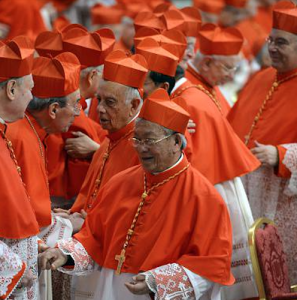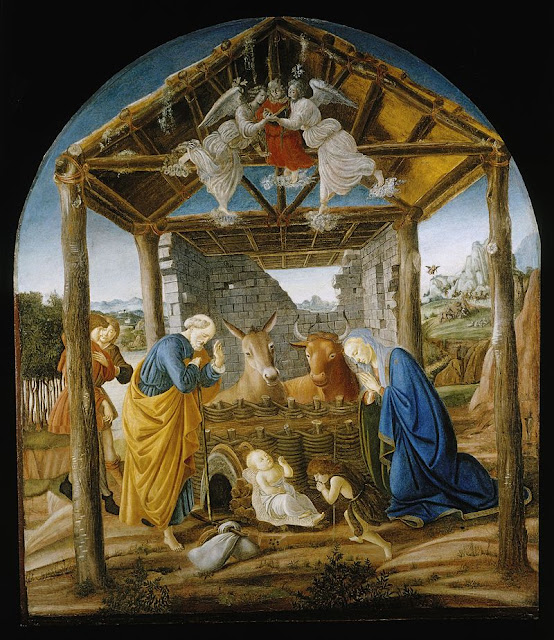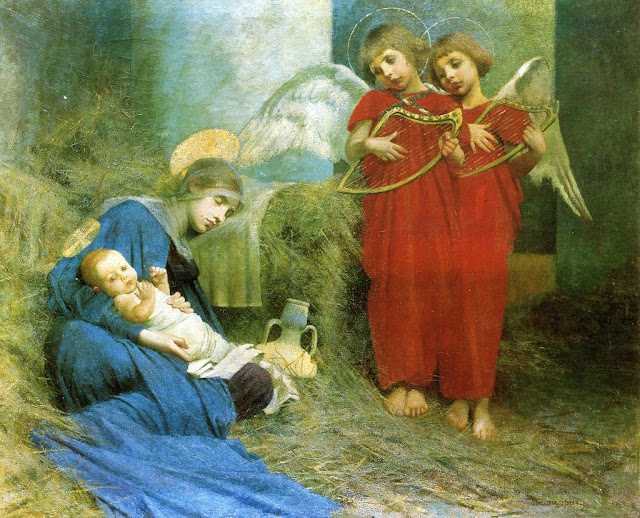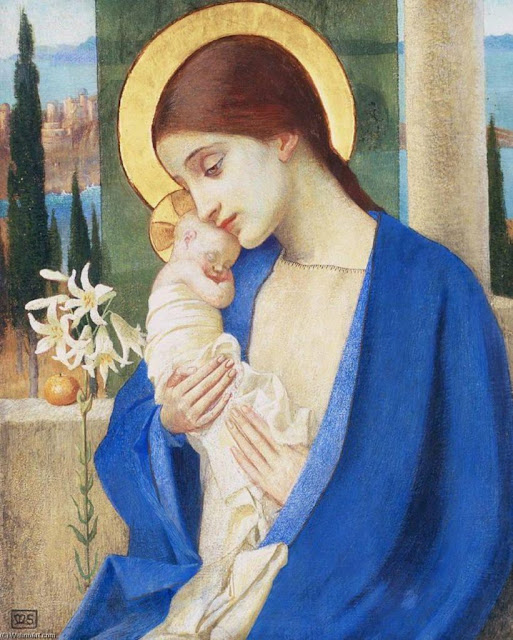
Friday, March 25, 2022
A Ukrainian Prayer by John Rutter with The Cambridge Singers
Tuesday, March 15, 2022
A Memorandum on the Next Conclave Is Circulating Among the Cardinals. Here It Is
Since the beginning of Lent the cardinals who will elect the future pope have been passing this memorandum around. Its author, who goes by the name of Demos, “people” in Greek, is unknown, but shows himself a thorough master of the subject. It cannot be ruled out that he himself is a cardinal.
From L'Espresso by Sandro Magister
THE VATICAN TODAY
Commentators of every school, if for different reasons, with the possible exception of Father Spadaro, SJ, agree that this pontificate is a disaster in many or most respects; a catastrophe.
1. The Successor of St. Peter is the rock on which the Church is built, a major source and cause of worldwide unity. Historically (St. Irenaeus), the Pope and the Church of Rome have a unique role in preserving the apostolic tradition, the rule of faith, in ensuring that the Churches continue to teach what Christ and the apostles taught. Previously it was: “Roma locuta. Causa finita est.” Today it is: “Roma loquitur. Confusio augetur.”
(A) The German synod speaks on homosexuality, women priests, communion for the divorced. The Papacy is silent.
(B) Cardinal Hollerich rejects the Christian teaching on sexuality. The Papacy is silent. This is doubly significant because the Cardinal is explicitly heretical; he does not use code or hints. If the Cardinal were to continue without Roman correction, this would represent another deeper breakdown of discipline, with few (any?) precedents in history. The Congregation for the Doctrine of the Faith must act and speak.
(C) The silence is emphasised when contrasted with the active persecution of the Traditionalists and the contemplative convents.
2. The Christo-centricity of teaching is being weakened; Christ is being moved from the centre. Sometimes Rome even seems to be confused about the importance of a strict monotheism, hinting at some wider concept of divinity; not quite pantheism, but like a Hindu panentheism variant.
(A) Pachamama is idolatrous; perhaps it was not intended as such initially.
(B) The contemplative nuns are being persecuted and attempts are being made to change the teachings of the charismatics.
(C) The Christo-centric legacy of St. John Paul II in faith and morals is under systematic attack. Many of the staff of the Roman Institute for the Family have been dismissed; most students have left. The Academy for Life is gravely damaged, e.g., some members recently supported assisted suicide. The Pontifical Academies have members and visiting speakers who support abortion.
3. The lack of respect for the law in the Vatican risks becoming an international scandal. These issues have been crystalized through the present Vatican trial of ten accused of financial malpractices, but the problem is older and wider.
(A) The Pope has changed the law four times during the trial to help the prosecution.
(B) Cardinal Becciu has not been treated justly because he was removed from his position and stripped of his cardinalatial dignities without any trial. He did not receive due process. Everyone has a right to due process.
(C) As the Pope is head of the Vatican state and the source of all legal authority, he has used this power to intervene in legal procedures.
(D) The Pope sometimes (often) rules by papal decrees (motu proprio) which eliminate the right to appeal of those affected.
(E) Many staff, often priests, have been summarily dismissed from the Vatican Curia, often without good reason.
(F) Phone tapping is regularly practised. I am not sure how often it is authorized.
(G) In the English case against Torzi, the judge criticised the Vatican prosecutors harshly. They are either incompetent and/or were nobbled, prevented from giving the full picture.
(H) The raid by the Vatican Gendarmeria, led by Dr. Giani in 2017 on the auditor’s (Libero Milone) office on Italian territory was probably illegal and certainly intimidating and violent. It is possible that evidence against Milone was fabricated.
4. (A) The financial situation of the Vatican is grave. For the past ten years (at least), there have nearly always been financial deficits. Before COVID, these deficits ranged around €20 million annually. For the last three years, they have been around €30-35 million annually. The problems predate both Pope Francis and Pope Benedict.
(B) The Vatican is facing a large deficit in the Pensions Fund. Around 2014 the experts from COSEA estimated the deficit would be around € 800 million in 2030. This was before COVID.
(C) It is estimated that the Vatican has lost € 217 million on the Sloane Avenue property in London. In the 1980’s, the Vatican was forced to pay out $ 230 million after the Banco Ambrosiano scandal. Through inefficiency and corruption during the past 25-30 years, the Vatican has lost at least another € 100 million, and it probably would be much higher (perhaps 150-200 million).
(D) Despite the Holy Father’s recent decision, the process of investing has not been centralized (as recommended by COSEA in 2014 and attempted by the Secretariat for the Economy in 2015-16) and remains immune to expert advice. For decades, the Vatican has dealt with disreputable financiers avoided by all respectable bankers in Italy.
(E) The return on the 5261 Vatican properties remains scandalously low. In 2019, the return (before COVID) was nearly $ 4,500 a year. In 2020, it was € 2,900 per property.
(F) The changing role of Pope Francis in the financial reforms (incomplete but substantial progress as far as reducing crime is concerned, much less successful, except at IOR, in terms of profitability) is a mystery and an enigma.
Initially the Holy Father strongly backed the reforms. He then prevented the centralization of investments, opposed the reforms and most attempts to unveil corruption, and supported (then) Archbishop Becciu, at the centre of Vatican financial establishment. Then in 2020, the Pope turned on Becciu and eventually ten persons were placed on trial and charged. Over the years, few prosecutions were attempted from AIF reports of infringements.
The external auditors Price Waterhouse and Cooper were dismissed and the Auditor General Libero Milone was forced to resign on trumped up charges in 2017. They were coming too close to the corruption in the Secretariat of State.
5. The political influence of Pope Francis and the Vatican is negligible. Intellectually, Papal writings demonstrate a decline from the standard of St. John Paul II and Pope Benedict. Decisions and policies are often “politically correct”, but there have been grave failures to support human rights in Venezuela, Hong Kong, mainland China, and now in the Russian invasion.
There has been no public support for the loyal Catholics in China who have been intermittently persecuted for their loyally to the Papacy for more than 70 years. No public Vatican support for the Catholic community in Ukraine, especially the Greek Catholics.
These issues should be revisited by the next Pope. The Vatican’s political prestige is now at a low ebb.
6. At a different, lower level, the situation of Tridentine traditionalists (Catholic) should be regularised.
At a further and lower level, the celebration of “individual” and small group Masses in the mornings in St. Peter’s Basilica should be permitted once again. At the moment, this great basilica is like a desert in the early morning.
The COVID crisis has covered up the large decline in the number of pilgrims attending Papal audiences and Masses.
The Holy Father has little support among seminarians and young priests and wide-spread disaffiliation exists in the Vatican Curia.
The Next Conclave
1. The College of Cardinals has been weakened by eccentric nominations and has not been reconvened after the rejection of Cardinal Kasper’s views in the 2014 consistory. Many Cardinals are unknown to one another, adding a new dimension of unpredictability to the next conclave.
2. After Vatican II, Catholic authorities often underestimated the hostile power of secularization, the world, flesh, and the devil, especially in the Western world and overestimated the influence and strength of the Catholic Church.
We are weaker than 50 years ago and many factors are beyond our control, in the short term at least, e.g. the decline in the number of believers, the frequency of Mass attendance, the demise or extinction of many religious orders.
3. The Pope does not need to be the world’s best evangelist, nor a political force. The successor of Peter, as head of the College of Bishops, also successors of the Apostles, has a foundational role for unity and doctrine. The new pope must understand that the secret of Christian and Catholic vitality comes from fidelity to the teachings of Christ and Catholic practices. It does not come from adapting to the world or from money.
4. The first tasks of the new pope will be to restore normality, restore doctrinal clarity in faith and morals, restore a proper respect for the law and ensure that the first criterion for the nomination of bishops is acceptance of the apostolic tradition. Theological expertise and learning are an advantage, not a hinderance for all bishops and especially archbishops.
These are necessary foundations for living and preaching the Gospel.
5. If the synodal gatherings continue around the world, they will consume much time and money, probably distracting energy from evangelization and service rather than deepening these essential activities.
If the national or continental synods are given doctrinal authority, we will have a new danger to world-wide Church unity, whereby e.g., the German church holds doctrinal views not shared by other Churches and not compatible with the apostolic tradition.
If there was no Roman correction of such heresy, the Church would be reduced to a loose federation of local Churches, holding different views, probably closer to an Anglican or Protestant model, than an Orthodox model.
An early priority for the next pope must be to remove and prevent such a threatening development, by requiring unity in essentials and not permitting unacceptable doctrinal differences. The morality of homosexual activity will be one such flash point.
6. While the younger clergy and seminarians are almost completely orthodox, sometimes quite conservative, the new Pope will need to be aware of the substantial changes effected on the Church’s leadership since 2013, perhaps especially in South and Central America. There is a new spring in the step of the Protestant liberals in the Catholic Church.
Schism is not likely to occur from the left, who often sit lightly to doctrinal issues. Schism is more likely to come from the right and is always possible when liturgical tensions are inflamed and not dampened.
Unity in the essentials. Diversity in the non-essentials. Charity on all issues.
7. Despite the dangerous decline in the West and the inherent fragility and instability in many places, serious consideration should be given to the feasibility of a visitation on the Jesuit Order. They are in a situation of catastrophic numerical decline from 36,000 members during the Council to less than 16,000 in 2017 (with probably 20-25% above 75 years of age). In some places, there is catastrophic moral decline.
The order is highly centralized, susceptible to reform or damage from the top. The Jesuit charism and contribution have been and are so important to the Church that they should not be allowed to pass away into history undisturbed or become simply an Asian-African community.
8. The disastrous decline in Catholic numbers and Protestant expansion in South America should be addressed. It was scarcely mentioned in the Amazonian Synod.
9. Obviously, a lot of work is needed on the financial reforms in the Vatican, but this should not be the most important criterion in the selection of the next Pope.
The Vatican has no substantial debts but continuing annual deficits will eventually lead to bankruptcy. Obviously, steps will be taken to remedy this, to separate the Vatican from criminal accomplices and balance revenue and expenditure. The Vatican will need to demonstrate competence and integrity to attract substantial donations to help with this problem.
Despite the improved financial procedures and greater clarity, continuing financial pressures represent a major challenge, but they are much less important than the spiritual and doctrinal threats facing the Church, especially in the First World.
Demos
Lent 2022
.
Monday, March 14, 2022
Saturday, February 19, 2022
Sunday, February 6, 2022
Seventy Years Ago Today - The Death of King George VI and the Accession of Queen Elizabeth II
Thursday, January 6, 2022
Sunday, December 26, 2021
Christmastide: The Celebration Has Just Begun!
What does December 26th mean to you?
For most people it means that Christmas is over. But for the Catholic Church, it means the celebration has just begun.
Many of us Catholics, however, are not aware of this. Our rhythm of celebrating Christmas is very much along the lines of the secular celebration. We put a massive amount of effort into preparing for December 25th...then, the very next day, we feel a bit blue.
“It’s over,” we think. We take down our Christmas lights, drag the tree out onto the curb, and return to our everyday lives.
Don’t! Stop right there.
The carols, the feasting, the lights, the joy, have only just commenced. We are about to rejoice in a long celebration of the birth of Christ, the Messiah.
There is a reason why Christmas is called a season. It does not last for a single day. We have been preparing for it for four weeks, and the Church couldn't possibly start and end its celebration of Christ's birth in one day. After Easter, Christmas is the most important liturgical feast in the Church calendar. Why? Because Christmas is what made Easter possible. Without Our Lord’s incarnation and birth, our redemption would not have been brought to completion, and there would be no hope for us in our fallen state.
So first, we celebrate the octave of Christmas. (The word “octave” refers to the number 8.) This means that there are eight official solemn days of rejoicing. In the language of the Church, the word “solemn” does not mean being grim, serious, or morose.
According to a simple definition: “In the Catholic Church year, a solemnity is the highest-ranking holy day possible in the Church calendar…” These are days that are emphasized by particular joy, lavishness, pomp, and glory.
This might be harder to recognize in the life of lay people, but it’s unspeakably obvious in the religious life, where the Divine Office (the prayer known as the Liturgy of the Hours) practically shouts out Hallelujah! During the octave of Christmas, the office that is prayed each day—for eight straight days—is more or less the same office: the one for Christmas day.
Think about what that means: it means that we are celebrating each day, for eight days, as though each of them were Christmas day itself.
The Church is so happy that she simply revels in the joy!
“Joy to the world, the Lord is come / Let earth receive her King!”
While the reality of the Christmas octave may be a new concept for many of us, who isn't familiar with the "12 Days of Christmas"? These 12 days refer to the Christmas octave as well as the four subsequent days which take us to the feast of Epiphany.
But there’s more. On the traditional liturgical calendar, the Christmas season (also known as Christmastide) lasts 40 days. It begins with the vigil Mass said on Christmas Eve, and ends on February 2nd, Candlemas, which is the day on which we celebrate the feast of Jesus' presentation in the temple.
 |
| Christmas at the Shrine of the Most Blessed Sacrament, Hanceville, AL |
The Christmas season is also full of incredible feast days. There are many ways to celebrate it as a Catholic should. Here’s a calendar of what you can look forward to, followed by some ideas on how to celebrate it with your family:
The Season of Christmas
We have seen a newborn infant and a choir of angels praising the Lord, alleluia.
— Antiphon for Christmas Morning
Christmas Octave
December 26th – Feast of St. Stephen, Deacon and First Martyr
December 27th – Feast of the St. John the Evangelist
December 28th – Feast of the Holy Innocents
December 29th – Feast of St. Thomas Becket, Archbishop and Martyr
December 30th – Feast of the Holy Family
December 31st – Feast of St. Sylvester I, Pope
January 1st – Solemnity of Mary, Mother of God (Holy Day of Obligation)
January 2nd – Feast of Saints Basil the Great and Gregory Nazianzen, Bishops and Doctors of the Church
January 3rd – Feast of the Holy Name of Jesus
January 4th – Feast of St. Elizabeth Ann Seton
January 5th – Feast of St. John Neumann
January 6th – Solemnity of the Epiphany (12th Day of Christmas)
Christmas Season
January 7th – Feast of St. Raymond of Penafort
January 8th to 12th – Christmas Weekdays
January 9th – Feast of the Baptism of the Lord – End of Christmas season on the new calendar
February 2nd – Candlemas (Presentation of the Child Jesus) – End of Christmas season on the old calendar
Ideas for Celebrating Christmastide
Monks, priests, and nuns have the privilege of being able to attend daily Mass. This means that they experience the Christmas season in a very special way, partaking in all the beauty of the liturgy.
But most of us have the responsibilities of life in the world. We have jobs to return to; kids to care for and bring back to school. We have family members in need.
However, there are some things you can do to keep the reality of Christ’s birth present for your family during Christmastide. Keep in mind: many of us are overwhelmed just trying to accomplish daily responsibilities, so don’t try to do all of the suggestions below. Perhaps choose one or two things to do, and no more.
1.
Keep your nativity scenes on display. Don't take down your tree. Keep your Christmas lights on each day as the day ends and the sky darkens. Light candles near your manger scene, perhaps while the family eats dinner.
2.
Pray the Litany to the Child Jesus during the Octave, or even throughout the entire season. If it's difficult to gather family members together for this, you could pray the litany privately before retiring for the night, or when you get up in the morning. This keeps fresh in our minds and hearts the joy of the Christ Child.
3.
Take note of the various saints' feast days that are celebrated during the Christmas season. If you don't have a book that contains brief biographies on various saints, you can become familiar with their stories through the Morning Offering daily devotional email. Ask them for their intercession. The saints are eager to offer petitions on our behalf!
4.
Consider hosting Christmas parties AFTER Christmas day. Much of the rush and anxiety is over, people are no longer attending office/family/friends' parties, and there is more down time. This opens spots on people's calendars (and reminds us that Christmas is not over!)
5.
Host an Epiphany Party. My own mother has begun this tradition. The Feast of Epiphany celebrates the visit of the Magi and their gifts to the Christ Child. This party can feature candlelight, wonderful food, singing Christmas carols and hymns together, and quality time with people who are a blessing in our lives. According to my family's personal delights, my mom liked to invite guests who would enjoy a literary bent: each of us might read a poem, a fictional excerpt, or a portion of Sacred Scripture, each of these readings having a Christmas theme. When possible, she also invites friends and family who play instruments, so that there can be accompaniment with the caroling. One year it was actually very cold in Jacksonville, Florida, and we had our fireplace lit for the guests to enjoy. There are so many things you can do that will fit your hosting preferences and personal tastes!
6.
If you have some days off from work, you could go to daily Mass or to Adoration. If you have the chance to do something active, social, or busy, you might consider graciously declining once or twice, and take time to rest in the peace of Christ instead. In our world of constant distractions, this might take some will power: we might have to force ourselves to sit and be still. And yet keeping company with the Christ Child in our hearts is the gift that He desires from us.
If you want to live a Catholic life that is richer and more deeply liturgical, you'll want to sign up for this series: Catholic at Home. Don't miss it!
Do you have any other ideas? If so, please share them in the comments below! We love hearing from you.








